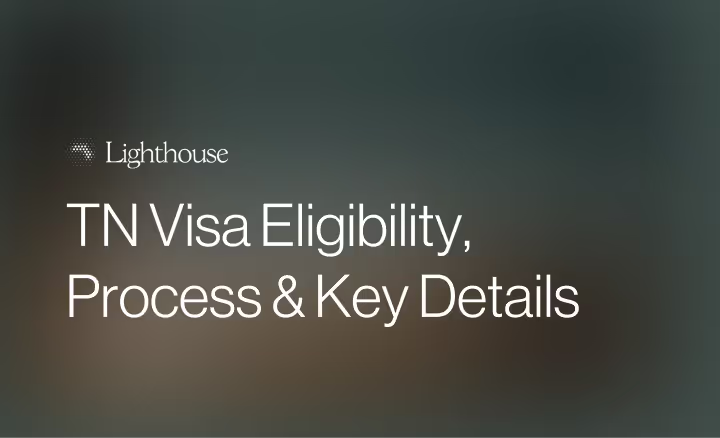The E-2 Visa Explained
Everything you need to know about the E-2 visa for entrepreneurs.


If you're an entrepreneur or investor from a treaty country looking to build or buy a U.S. business, the E-2 Treaty Investor Visa offers a path to live and work in the United States. This guide walks through what it is, who qualifies, and how to apply.
What Is the E-2 Visa?
The E-2 Treaty Investor Visa allows nationals of countries with a treaty of commerce and navigation with the United States to invest in and manage a U.S. business. This non-immigrant visa is designed for entrepreneurs, business owners, and certain key employees who plan to develop and direct an American enterprise.
The E‑2 is relatively flexible compared with other temporary work visas. It does not have a yearly quota or lottery system, and renewals are possible as long as the business continues to operate and meet E‑2 requirements. However, this classification remains temporary and does not lead directly to permanent residence.
The E‑2 visa has historically been used by investors from treaty countries such as Canada, Japan, Australia, and France to establish or manage small and midsize enterprises in the United States. These businesses range from service firms to manufacturing operations, though eligibility hinges on active management and continued investment.
Rights and Opportunities under E-2 Status
Once approved, you gain several important rights:
Work legally: You're authorized to work for the U.S. business in which you've invested. Your role must involve developing and directing the enterprise, typically as owner, executive, manager, or in a supervisory capacity.
Bring your family: Your spouse and unmarried children under 21 can accompany you on E-2 dependent status. Your spouse is employment-authorized incident to status and can work in the United States.
Travel internationally: You can travel in and out of the U.S. Each time you re-enter at a port of entry with a valid E-2 visa, U.S. Customs and Border Protection typically grants another two-year period of admission.
Hire employees: You can bring key employees from your home country to work in executive, supervisory, or other essential roles. They must share your nationality and qualify under the same E-2 classification.
E-2 Visa Eligibility
Treaty Country Nationality
You must be a citizen of a country that maintains a treaty of commerce and navigation with the United States. Currently, more than 80 countries qualify, including Australia, Austria, Bangladesh, Bolivia, Cameroon, Canada, Croatia, Estonia, France, Grenada, Honduras, Ireland, Israel, Italy, Japan, New Zealand, Pakistan, Poland, Senegal, Singapore, South Korea, Suriname, Switzerland, and many others.
The full list of treaty countries is maintained by the U.S. Department of State.
If the investment enterprise is owned by a company rather than an individual, at least 50% of the business must be owned by nationals of a treaty country. This ensures the enterprise maintains its treaty status.
Substantial Investment Requirement
You must have invested or be actively in the process of investing a substantial amount of capital in a bona fide U.S. business. "Substantial" is proportional. The investment must be:
- Sufficient to ensure the successful operation of the enterprise
- Large enough relative to the total cost of purchasing or establishing the business
- Demonstrably at risk, meaning the capital has been committed and could be lost if the venture fails
There's no fixed dollar minimum. A $200,000 investment in a small consulting firm might qualify as substantial, while a $500,000 investment in a capital-intensive manufacturing operation might not. The relationship between your investment and the overall cost of the enterprise determines whether it meets the threshold.
The investment must come from legitimate sources: personal savings, business income, or loans secured by your own assets. You'll need to document the path of funds from their origin into the U.S. business through bank statements, wire transfers, receipts, and other financial records.
Ownership and Control
You must own at least 50% of the enterprise or possess operational control through a managerial position or corporate structure. The investment must be yours personally or belong to a company you control that meets treaty nationality requirements.
If your E‑2 classification is based on owning at least half of the company, future fundraising that reduces your ownership below 50% can jeopardize your E‑2 status. Dilutive equity rounds or structural changes that diminish your control may cause you to fall out of eligibility. Before raising outside capital or changing ownership structure, it’s critical to review how the change could affect visa compliance.
The business must be a real, active, operating commercial venture that produces goods or services for profit to be considered a bona fide enterprise. Passive investments (such as undeveloped land held for appreciation or stock portfolios) do not qualify.
If you're applying as an employee of a treaty investor (rather than as the principal investor yourself), you must:
- Share the same nationality as the principal investor
- Hold an executive, supervisory, or essential employee position
- Possess skills, qualifications, or expertise that are critical to the enterprise's operation
Nonimmigrant Intent
The E-2 is a nonimmigrant visa, which means you must intend to depart the United States when your E-2 status ends. Unlike the H-1B visa, the E-2 does not formally permit dual intent. You cannot explicitly state plans to pursue permanent residence when applying.
Many E-2 visa holders eventually do transition to green card status through separate pathways such as the EB-5 Immigrant Investor program or employment-based categories. However, the two processes remain legally distinct.
E-2 Visa Application Process
Two Main Routes
1. Consular Processing (Outside the U.S.)
Most first-time E-2 applicants apply through a U.S. Embassy or Consulate in their home country. Each consulate has specific procedures, documentation requirements, and processing timelines, so you'll need to review the website for your specific location.
2. Change of Status (Inside the U.S.)
If you're already in the United States in lawful nonimmigrant status (such as on an F-1 student visa or B-1/B-2 visitor visa), you can file Form I-129 (Petition for a Nonimmigrant Worker) with U.S. Citizenship and Immigration Services (USCIS) to request a change of status to E-2. This allows you to begin working once USCIS approves your petition without leaving the country.
Important note: A change of status gives you E-2 status, not an E-2 visa. If you travel internationally, you'll need to visit a U.S. consulate to obtain an E-2 visa stamp before reentering the United States.
Consular Application Steps
Prepare documentation package
- Complete Form DS-160 (Online Nonimmigrant Visa Application) and Form DS-156E (Nonimmigrant Treaty Trader/Investor Application)
- Pay the $315 visa application processing fee
- Assemble your evidence package:
- Detailed business plan outlining operations, market analysis, staffing projections, and five-year financial forecasts
- Proof of investment: wire transfers, receipts, lease agreements, purchase contracts, equipment invoices, bank account statements
- Corporate documents: articles of incorporation, operating agreement or bylaws, stock certificates, tax identification number (EIN)
- Source of funds documentation tracing capital from origin to the U.S. bank account
- Passport and proof of treaty country nationality
Schedule and attend a visa interview
Contact the U.S. Embassy or Consulate in your home country to schedule an interview appointment. During the interview, a consular officer will review your documentation, ask about your business plans, verify your investment, and assess whether you meet all E-2 requirements.
Processing times vary by consulate. Some locations process applications in weeks, others take several months. Check the specific embassy's website for current wait times.
Visa issuance and travel
If approved, you'll receive an E-2 visa stamp in your passport. The visa's validity period depends on your nationality under reciprocity agreements. This validity determines how long the visa can be used to enter the United States, but it's separate from your period of stay once you arrive.
When you enter the U.S. at a port of entry, a U.S. Customs and Border Protection officer will review your documents and typically grant you a two-year initial period of stay.
USCIS Change of Status Process
If you're filing from within the United States, the process involves:
File Form I-129 with E supplement
Your qualifying employer (or you, if you're the principal investor) files Form I-129 with USCIS along with the same documentation required for consular processing.
Pay filing fees
- Base filing fee: $460 (standard USCIS I-129 fee)
- Optional premium processing: $2,805 for a decision within 15 calendar days
USCIS review
Standard processing typically takes three to six months. USCIS may issue a Request for Evidence (RFE) if they need additional documentation or clarification.
Approval and status change
If approved, you will receive Form I-797 (Approval Notice) confirming your change to E-2 status. You can begin working immediately for the enterprise specified in your petition. However, if you travel internationally, you'll need to obtain an E-2 visa stamp at a consulate before returning to the United States.
Period of Stay, Extensions, and Reentry Rules
Initial Stay
When you first enter the U.S. on an E-2 visa or when USCIS approves your change of status, you're typically granted a two-year period of stay. This is your authorized time to remain in the country, separate from your visa's validity.
Extensions
You can extend your E-2 status in two-year increments as many times as needed, provided your business remains active and continues to meet all requirements. To extend:
- File Form I-129 with USCIS before your current authorization expires
- Submit updated financial statements, tax returns, business records, and evidence that the enterprise continues to operate successfully
- Pay the required filing fee (and optional premium processing fee if time-sensitive)
Reentry Rules
Each time you leave the United States and reenter with a valid E-2 visa, the U.S. Customs and Border Protection officer at the port of entry typically grants you another two years of admission automatically. This means frequent international travelers can maintain E-2 status without filing extension paperwork with USCIS as long as their visa stamp remains valid.
Your family members' periods of stay are tied to yours. Unless they accompany you during reentry or travel and return within the new admission period, they'll need to file separate extension applications to maintain lawful status.
E-2 Visa Fees and Associated Costs
Mandatory Fees Paid to Government Agencies
Consular processing:
- Form DS-160 visa application fee: $315 (paid before the interview at most consulates)
- Reciprocity or visa issuance fee: varies by nationality. Check the U.S. Department of State reciprocity schedule for your country.
USCIS change of status or extension:
- Form I-129 filing fee: $460
- Form I-539 (Application to Extend/Change Nonimmigrant Status): $470 (required for spouses and children under 21)
- Optional premium processing: $2,805 for a 15-day decision
Note: Fees are subject to change. Check current rates on USCIS and Department of State websites.
Investment Capital
The investment amount itself is separate from filing fees. Your substantial investment (whether $100,000, $300,000, or more) goes into establishing or purchasing the U.S. business. This capital must be committed, at risk, and documented through financial records.
Professional Services
Many investors work with business plan consultants, accountants, and immigration professionals to compile documentation packages. These costs vary widely depending on complexity and the level of support required.
Dependents on the E-2 Visa
Eligibility to Qualify as Dependents
Your spouse and unmarried children under 21 can accompany you to the United States on E-2 dependent status. They do not need to share your nationality. Family members from any country qualify as long as they meet the relationship requirement.
Other relatives (parents, siblings, adult children over 21, or married children) are not eligible for E-2 dependent classification.
Spousal Work Authorization
Spouses of E-2 visa holders are employment authorized incident to status. As of January 2022, the Department of Homeland Security (DHS) updated admission codes to reflect this. Spouses receive E-2S status on their Form I-94 (Arrival/Departure Record), which serves as proof of employment authorization for Form I-9 purposes.
Your spouse does not need to apply for an Employment Authorization Document (EAD) but may choose to file Form I-765 (Application for Employment Authorization) with USCIS to obtain an EAD card for convenience.
Education and Daily Life
Your children can attend U.S. schools at any level (elementary, secondary, college, or university) without needing separate student visa status. Both your spouse and children can open bank accounts, obtain driver's licenses, and participate in daily activities.
Maintaining Dependent Status
Your family members' E-2 status is directly tied to yours. When your status expires or ends, theirs does too. When you file for an extension or travel internationally for a new admission period, your dependents must ensure their own documentation remains current to maintain continuous lawful status.
E-2 Visa Validity and Relationship to Nationality
The validity period of your E-2 visa stamp depends on your country of citizenship under U.S. reciprocity agreements. These periods vary significantly by country and are determined by bilateral treaties.
This validity determines how long you can use the visa to enter the United States at a port of entry. It does not dictate how long you can stay once inside the country. That's governed by the period of stay granted on your Form I-94 (typically two years per admission).
You can renew your visa stamp at a U.S. consulate whenever it expires, as long as your business remains operational and you continue to meet E-2 requirements.
Evaluation Criteria for E-2 Visa Adjudication
When reviewing E-2 applications, consular officers and USCIS adjudicators assess four main areas:
Investment Legitimacy
You must demonstrate that funds came from lawful sources and have been committed to the bona fide enterprise. Documentation includes:
- Bank statements showing fund transfers
- Tax returns or business financial records proving income sources
- Loan documents secured by your personal assets
- Evidence that capital is at risk and irrevocably committed
Speculative or idle investments do not qualify. The money must be actively deployed in business operations: paying for real estate, equipment, inventory, salaries, marketing, or other operational expenses.
Business Viability
The enterprise must be real, active, and capable of generating substantial income. Evidence includes:
- A detailed business plan with market analysis, competitive positioning, and financial projections
- Proof of operations: client contracts, invoices, payroll records, supplier agreements
- Facility lease or purchase documentation
- Licenses, permits, and registrations are required to operate legally
- Evidence of employees hired or plans to hire U.S. workers
New businesses should demonstrate the capacity to become profitable within five years or create jobs for U.S. citizens and permanent residents.
Treaty Country Compliance
At least 50% of the enterprise must be owned by nationals of a treaty country. For individual investors, this is straightforward. For corporate investors, you'll need to document the nationality and ownership percentages of all shareholders.
Document Completeness
Missing financial records, incomplete corporate filings, unclear ownership structures, or insufficient proof of investment often lead to administrative delays or denials. Well-organized, thorough documentation packages move through the process more smoothly and reduce the likelihood of Requests for Evidence.
FAQs About E-2 Visas
What is an E-2 visa, and who can apply?
The E-2 treaty investor visa allows nationals of treaty countries to invest substantial capital in U.S. businesses and live in America while developing those enterprises. You must be a citizen of one of over 80 qualifying countries, make a substantial investment, and actively manage the business operations.
What countries are eligible under the E-2 treaty list?
More than 80 countries maintain treaties of commerce and navigation with the United States. Check the current treaty countries list on the U.S. Department of State website.
How much investment is considered "substantial" for E-2 requirements?
There is no fixed minimum amount. The investment must be substantial relative to the business's total cost and sufficient to ensure successful operations. The lower the cost of the enterprise, the higher the investment percentage typically needs to be.
Can an E-2 investor bring employees or family to the U.S.?
Yes. Your spouse and unmarried children under 21 qualify as dependents regardless of their nationality. Your spouse receives employment authorization incident to status. You can also petition for essential employees who share your treaty country nationality for executive, supervisory, or specialized skill positions.
How long can I stay on an E-2 visa, and can I renew it indefinitely?
Initial E-2 status grants two years of authorized stay. You can extend for additional two-year periods unlimited times as long as your business remains active and viable. Each international trip with a valid E-2 visa typically grants another automatic two-year admission period.
Can I transition from an E-2 visa to a green card or permanent residence?
The E-2 does not provide a direct path to permanent residence, but you can pursue other green card categories while maintaining E-2 status. Common options include EB-5 investor visas, employment-based categories, or family sponsorship if eligible.
What happens if my business underperforms or closes while I hold E-2 status?
Your E-2 status depends on maintaining the qualifying investment and business operations. If your enterprise fails or becomes marginal, you must either restructure to meet requirements, make additional investment, change to another visa category, or prepare to depart the United States.
How can Lighthouse assist with E-2 visa preparation and filing?
Lighthouse provides eligibility evaluation, business plan development, investment documentation, petition preparation, and ongoing extension management. Our team combines immigration expertise with technology to streamline the application process and provide guidance through successful U.S. business establishment.
Lighthouse provides expert guidance and legal review to strengthen your case.
From document prep to USCIS submission, Lighthouse ensures your petition meets every requirement.

%201.svg)


